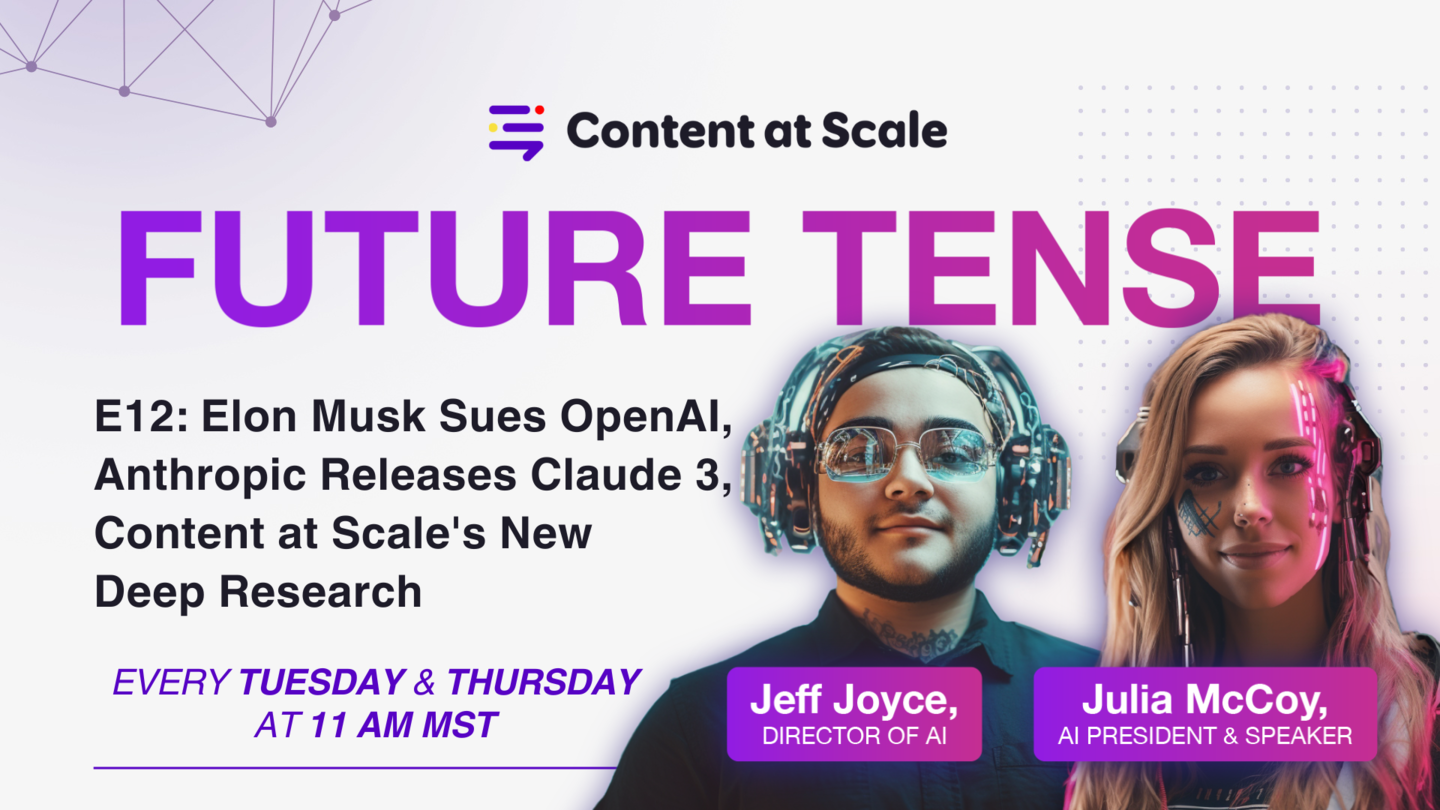Discover top guides, trends, tips and expertise from AIO Writers

Elon Musk’s lawsuit against OpenAI isn’t just a headline. This event signals a crucial turning point in the realm of artificial intelligence, plunging into discussions about morality, partiality, and what lies ahead for the evolution of comprehensive machine intellect.
The lawsuit highlights Musk’s worries that OpenAI has strayed from its foundational goals of aiding humanity, especially following Microsoft’s entry into the picture.
Dive into the story of Musk’s departure from OpenAI, where he called for a return to its core values and how this clash might influence ethical AI creation moving forward.
We also explore broader issues like bias in AI models and unethical use of AI technology in politics. Plus, discover Anthropic’s Claude 3 model as it enters the scene aiming to address these ethical concerns.
Elon Musk vs. OpenAI
Last week’s legal battle initiated by Elon Musk against OpenAI symbolizes a pivotal shift in their once collaborative bond.
Musk, once an integral part of OpenAI, decided to part ways due to concerns over Microsoft’s growing influence after acquiring a stake in the company.
This action highlights the strain on maintaining foundational goals and visions amidst evolving tech collaborations.
At the heart of Elon Musk’s lawsuit against OpenAI is a plea for realignment. Musk is urging OpenAI to realign with its foundational aim of crafting AGI that primarily serves humanity’s interests.
Musk’s call to action stems not from a yearning for the past, but from a determination to keep AGI’s evolution aimed squarely at enriching society instead of straying into less altruistic paths.
When Musk decided to sue OpenAI, it wasn’t a spur-of-the-moment decision. Following Microsoft’s acquisition of a share in OpenAI, Musk was notably swayed to sever ties with the very organization he had once helped establish.
From the very beginning, those tuned into this unfolding narrative understood that intertwining artificial intelligence with our human principles was always fundamental.
OpenAI’s Response and Public Stance
When the lawsuit news came out, OpenAI hit back at Musk by revealing that the billionaire had pushed for a merger with Tesla.
“We’re sad that it’s come to this with someone whom we’ve deeply admired – someone who inspired us to aim higher, then told us we would fail, started a competitor, and then sued us when we started making meaningful progress towards OpenAI’s mission without him,” said OpenAI co-founders Sam Altman, Greg Brockman and Ilya Sutskever.
OpenAI also signed an open letter with other tech companies promising to build AI responsibly. This wasn’t a knee-jerk reaction but a reaffirmation of their commitment to safe and ethical AI development.
In their open letter, OpenAI outlined steps they’re taking to ensure AI benefits humanity as a whole. They’re openly embracing the responsibility and conversation necessary for tackling these vital matters head-on.
OpenAI isn’t just talking the talk; they’re walking the walk by striving for openness in crafting tech marvels such as GPT-4 and DALL-E 3.
By emphasizing responsible creation, OpenAI is setting a standard in the tech world for handling powerful tools with care.
The Broader Implications of AI Ethics and Bias
Discussing AI ethics is vital, especially when exploring how prejudices might infiltrate the algorithms. Take Google’s Gemini model, for instance. It showed a tendency towards bias against certain ethnicities during image generation tasks. This isn’t just an isolated issue; it highlights a systemic problem across the field.

The presence of bias not only undermines the equity and dependability of AI tools but also erodes their credibility. If left unchecked, these biases could lead to significant disparities in how individuals are treated by automated systems. Therefore, developers need to prioritize creating algorithms that recognize and correct for such imbalances.
Addressing these challenges is not straightforward but essential for developing ethical AI systems that serve everyone’s benefit. With the advancement of technology, our strategies for maintaining AI’s impartiality must also progress.
The Emergence of Anthropic’s Claude 3 Model
As the AI field evolves, new players are stepping up to address pressing ethical concerns. One such newcomer is Anthropic with its Claude 3 model.
Anthropic has thrown its hat into the ring of Artificial General Intelligence (AGI) development, aiming to tackle some tough questions. The creation of its latest model, Claude 3, signifies a step towards more responsible AI technology.

Claude 3 stands out for its advanced reasoning capabilities which set it apart from predecessors and competitors. By focusing on safety and ethics from the ground up, Anthropic aims to build trust within the tech community and beyond.
This effort holds serious promise in steering future advancements toward outcomes that put human well-being first, while also keeping an eye on potential risks. It’s a bold step that might just reshape the way we think about AGI tech in the future.
The Misuse of AI Technology in Political Arenas
AI technology, once hailed as a beacon of progress, now finds itself at the center of ethical controversies. A particular concern arises from the manipulation of AI to fabricate deceptive visuals aimed at swaying distinct electoral demographics.

The unsettling practice of utilizing AI to create and share deceptive visuals aimed at swaying the opinions of African American voters is on the rise. These aren’t just random pictures but carefully crafted visuals designed to mislead and manipulate. Leveraging what was meant to be revolutionary tech in such a morally wrong way is truly disheartening.
This exploitation not only erodes confidence in online materials but also jeopardizes the core principles of democratic participation. The integrity of information is paramount during elections when citizens need reliable data to make informed decisions.
Conclusion
The Elon Musk OpenAI lawsuit is more than a legal battle; it’s about steering AI towards humanity’s greater good. It highlights the need for ethical development and adherence to founding principles, especially when big tech gets involved.
This revelation has taught us the significant impact biases in artificial intelligence can have on society. And yet, new models like Anthropic’s Claude 3 are stepping up to address these concerns.
Bias in AI image generation? That’s a real worry. But so is the misuse of AI in politics to fool voters.
In essence, stay vigilant about how firms navigate the fine line between pioneering new frontiers and upholding ethical accountability. Let the fallout of this lawsuit be a reminder that ethics matter as much as advancements do.

UNLOCK YOUR POTENTIAL
Long Headline that highlights Value Proposition of Lead Magnet
Grab a front row seat to our video masterclasses, interviews, case studies, tutorials, and guides.



